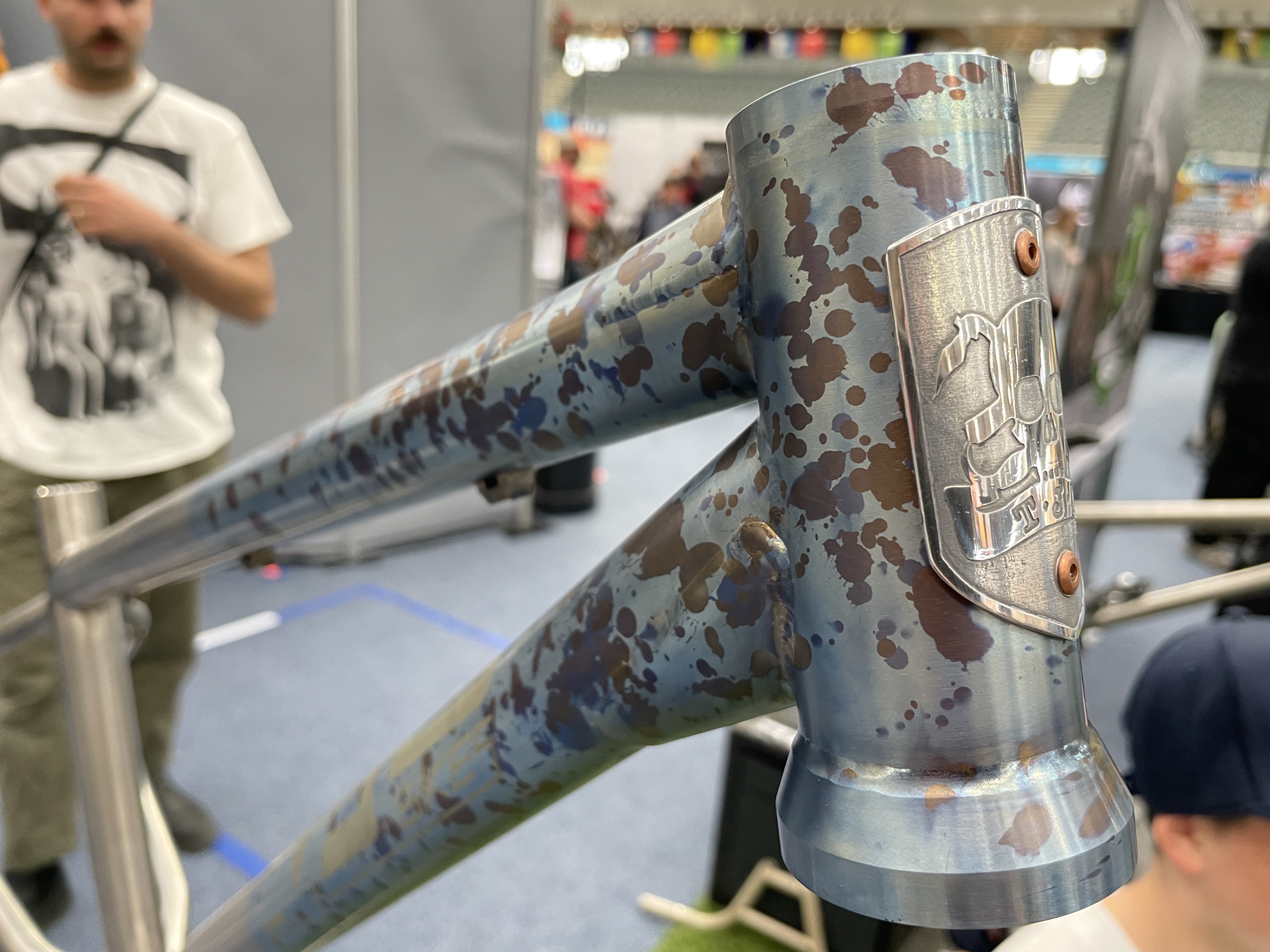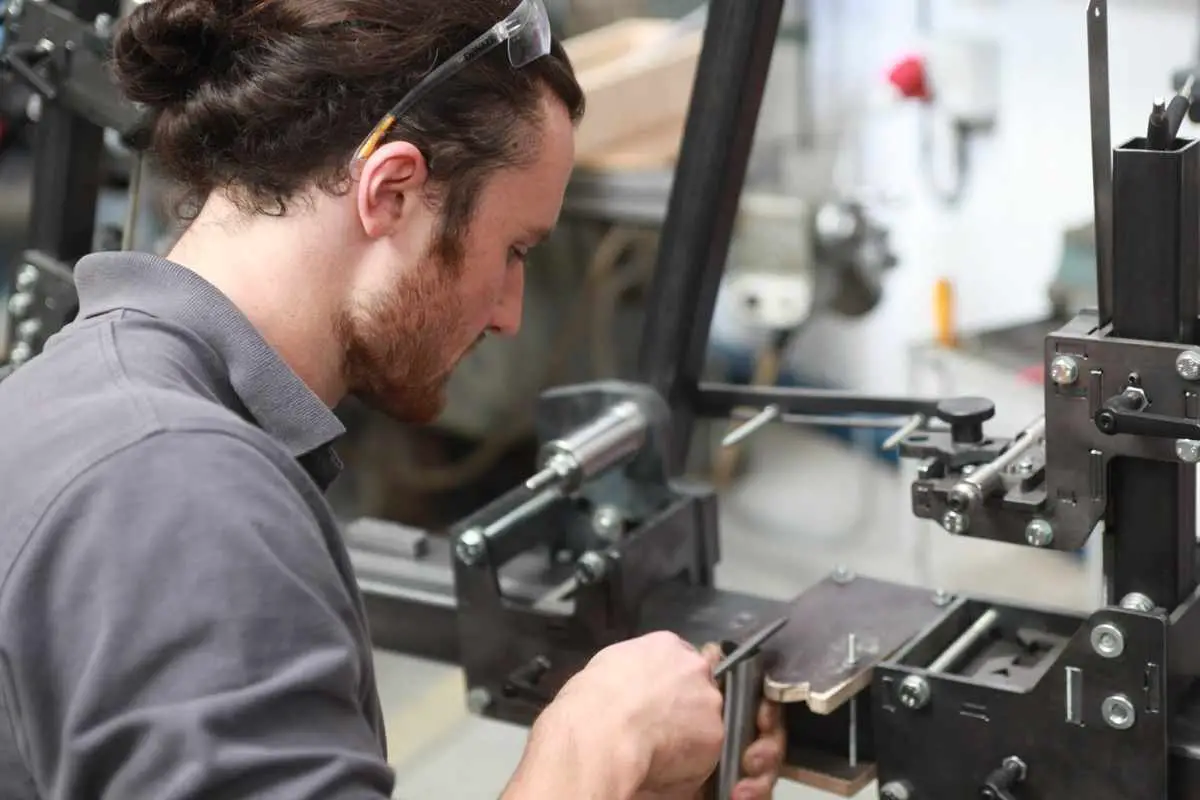The Heritage Crafts Association has been tracking the health of crafts in the UK since 2017, ranking traditional crafts by the likelihood they will survive to the next generation. This year, ‘bicycle frame making’ has joined the list of ‘endangered’ crafts, shifting from a previous status of ‘viable’.
For this ranking exercise, a heritage craft is defined as “a practice which employs manual dexterity and skill at the point of production, an understanding of traditional materials, design and techniques, and which has been practised for two or more successive generations.” Using information such as the current number of craftspeople and trainees, the average age of practitioners, opportunities to learn, and other issues affecting the future of the crafts, including the impact of the energy crisis, the study assesses how likely it is that the craft skills will be passed on to the next generation. There are four categories: extinct, critically endangered, endangered or currently viable.
If you look down the list, you will see all sorts of crafts for which it seems understandable there is low demand in a modern age: how many orrery makers do you need when you can explore real footage space from your own home computer? Other crafts you can image are occasionally really desirable – essential maybe even – but only to a very few: if you need a bell, you probably need someone who can do bell founding. But how often does anyone actually need a new bell? It’s not like we’re a nation that’s churning out new churches and ships.

However, we are a nation that rides plenty of bicycles, so what is bicycle frame making doing on the ‘Endangered’ list?
In its description of the historical context of bicycle frame making, the Heritage Crafts Association states:
Historically, there had been local frame builders in most towns in the UK. By the mid-1980s there were 150-200 frame builders still operating, although most were older and on the verge of retiring. By the late-1980s, the bicycle industry had changed dramatically with the introduction of cheap imports from Taiwan/China which finished off many of the remaining frame builders, and by the early-1990s the craft had all but disappeared with no more than a dozen makers left, usually those with an individual name/reputation rather than the local town frame builders. Frame builders today are usually one person businesses, with most makers in their 40/50s and some in their mid-30s.
The shape of the frame making trade in the UK is still changing. In addition to the established frame builders there are a large number of start-ups springing up in response to an increasing interest in cycling. Some of these are making some innovative new designs using unusual materials.
Heritage Crafts Association
The report also lists the following issues affecting the viability of the craft:
- Size of market: based on research and figures of tubing and frame parts sales (from suppliers to the builders) over the past two years, there are only around 450 bespoke frames being made per year – so the market is quite small in that sector. There are probably another 1,000-1,200 (total) being made by larger companies – these may be made to order but not bespoke.
- Training issues: there are no formal training opportunities available in bicycle making and few businesses have the capacity or resources to take on trainees. There are a number of short courses available where people build themselves a frame and some masterclasses for those who wish to develop their skills. Training in advanced and specialist skills can be difficult to access.
- Business skills: there is very little training available for those who want to start a bicycle making company and some have difficulty in marketing their products and communicating effectively with clients. It is very challenging to develop a sustainable bicycle making business from scratch due to high start-up costs and the high retail value of the finished product. Many bicycle makers have to diversify or make other products to generate a living wage.
- Issues relating to passing on a business: many frame builders are individuals and the name is the business – this makes it very hard to pass a business on as a going concern.
- Availability of raw materials: In early 2021, bicycle making businesses were reporting supply chain issues with sourcing stainless steel tubing. If this continues to be a problem it could have an ongoing impact on manufacturing.
The report notes that there are a number of part time or amateur frame builders, of whom many might hope to turn their sideline or hobby into a full time role. It estimates there 11-20 professional makers who earn their main income from frame building, and another 11- 20 professionals for whom it is a sideline. It judges that there are between six and ten serious amateur makers, and up to 15 ‘leisure makers’.
The listing also includes ‘Crafts people currently known’ as follows:
- Argos Cycles
- Brian Rourke Cycles
- Curtis Bikes
- Dave Yates
- Demon Frame Works
- Doug Pinkerton
- Ellis Briggs Cycles
- Enigma semi production, specialises in titanium
- Feather Cycles
- Field Cycles
- Geoff Roberts Frames
- Hallett Handbuilt Cycles
- Hartley Cycles / Isen Workshop
- Hewitt Cycles
- Lee Cooper – only builds for trade customers
- Limit BMX
- Longstaff Cycles
- MacKenzie Cyclone
- Macolm Custom Bicycles
- Mercian
- Moss Bikes
- Neill Orrell Cycles (now Butterfield Bicycles)
- Pashley Cycles mass production
- Paulus Quiros
- Pennine Cycles
- Peter Bird and Robert Wade (Swallow Bespoke) – Bicycles By Design and Ironbridge Bicycles
- Saffron Frame Works
- Shand Cycles – semi production
- Starling Cycles
- Sven
- Ted James
- Tom Donhou
- Woodrup
- ICE Trikes – recumbent bikes
- Crossley metals
- Eastwood cycle works
- Meteor works
- Lord Cycles
- Quirk Cycle
- Smithy Frame Works
The frame building listing also notes that there are the related sub-tasks of ‘Polishing thin walled tubing’ (very few practitioners) and ‘Lug cutting’ (no practitioners).
Do you spot any missing? Gav from Coal Bikes and Ralph from Ra bikes don’t appear to be there, so perhaps there are a few more builders out there. Stanton isn’t on the list either, and nor is Fiveland – but maybe they count as production?

In publishing the list, Mary Lewis, Heritage Crafts Endangered Crafts Manager, made the following observations:
The cumulative effect of COVID-19, Brexit, the energy crisis sparked by the war in Ukraine, and the ensuing financial troubles have all had a brutal impact on many crafts businesses already struggling to make ends meet. I have spoken to so many craftspeople who are having to make heartbreaking decisions between buying in materials, keeping their workshops powered, and paying themselves even a minimum wage. This is all on top of the pre-existing structural issues such as the lack of training routes and government financial support for training.
We have always talked about the cultural loss that is borne every time a craft is lost, but over the last few years we have begun to notice another phenomenon. We increasingly see how crafts operate with a degree of inter-dependence. They form a complex ecosystem, with associated skills, supply chains and economies of scale that come with the level of specialisation you used to see in cities like Sheffield, Birmingham and Stoke. When one business closes, or one craft becomes extinct, it can have a knock-on effect on other allied crafts. The fear is that if we continue to witness this haemorrhaging of skills we may soon get to a tipping point, beyond which the collapse of heritage crafts in the UK accelerates exponentially.
Mary Lewis, Heritage Crafts Endangered Crafts Manager
These thoughts about the spiralling effect of skills loss have echoes of the conversations I have had with people in the bike industry. When you have a concentration of skills and experience, everything is easier – and often more efficient. So it is that hand builders find themselves up against not only the efficiencies of factory production – and the consumer’s price conscious purchasing choices – but also battling against the tide.
Petor Georgallou, co-owner of the hand made bicycle show Bespoked, says that here in the UK, framebuilders – and the broader bicycle industry – are battling the same effects of Covid and energy costs, but with the added influence of Brexit. This makes it even harder to be a frame builder in the UK than it is elsewhere in the world.
The Heritage Crafts Association factors in opportunities to train in the craft in its rankings, and Petor says that the significance of the loss of the Bicycle Academy cannot be underestimated. He believes that a significant proportion of the builders exhibiting at Bespoked got their start with the Bicycle Academy, and their closure last year will impact the number of people learning frame building skills in the UK. He contrasts the situation with France, where as well as not having Brexit impacts, the French government is supporting the establishment of a new ‘Victoire‘ frame building school.
Petor also notes that the loss of distributors like Moore Large has led to some brands going direct, rather than re-signing with alternative distributors. For a small frame builder, this means placing orders for components with a number of different companies, rather than a single distributor of many parts. If you’re already juggling another job with your frame building sideline, or operating on the leanest of margins, this kind of administrative inefficiency can be significant.
The disruption in the broader bike industry has two sides to it. On the one hand, Petor thinks the bicycle buying market is slowing as big brands trim their marketing budgets and draw in fewer riders. There are also plenty of great offers to be had in the industry, due to the overstocking of products – making it harder for a hand built frame builder to compete in the £2-4k frame market in which they’ve largely operated. But Petor thinks there’s a flip side:
Frame building will always exist, the question is where it exists. Frames built in Taiwan are still using frame building skills. Here in the UK, Brexit and USA trade deals have made operating unbelievably tough – tougher than elsewhere in the world – but there is hope. The demand for hand built frames, and the bicycle culture that goes with it, still exists in the UK, partly thanks to shows like Bespoked that help support frame building culture and legitimise frame building. As the broader bicycle industry saves costs and tries to shift its excess inventory, it is delivering a poorer customer experience, and stepping back from marketing activities that help nurture the ecosystem of cycling culture. For many, it’s not just about buying a bike, it’s about buying into a whole culture of cycling. Frame builders offer cycling enthusiasts the experience, knowledge, story and unique product that those riders are looking for.
Petor Georgallou






